#House Rules
Text
GMs: What's a rule/mechanic you've stolen from one game and use in almost every game you run?
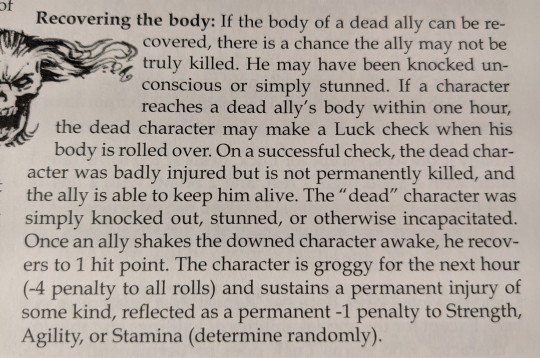
One of mine is Dungeon Crawl Classic's "Recovering the body" rule - in which dead PCs have a chance of quite dramatically NOT being dead and instead being barely alive and wounded when the other PCs go to recover the body. It makes for such a fun final roll for the character and can have a wonderfully dramatic and exciting payoff if the roll goes well. Plus, because it's a "may" rule it gives the player a chance to say "No, I think Alfred the Wise dies here. It's a fitting end." and it's only utilized when they want that exciting maybe final moment with the character.
844 notes
·
View notes
Text
Wednesday Addams and Enid Sinclair - House Rules (as imagined by me)
WELCOME TO THE ADDAMS-SINCLAIR MANOR (APARTMENT 3B.) PLEASE READ.
1) Our doorbell does not work. If you want to enter, you have to yell “HOMOSEXUALS” very loudly and we will admit you at our leisure.
2) No fires. Or perhaps we should reword that and say no more fires, due to the multiple infringements that rule already has. Looking at you, Yoko.
3) If you’re not a Nevermore friend, a family member - NOT Enid’s, please - or someone we’ve paid to bring us food, please leave us alone. Write a note, send a text. We don't need to talk in person.
4) If anyone complains about Enid’s housewide playlist, they will be removed. In other words: Enid Sinclair is a musical genius and you should trust everything she says ever.
5) The following list of people are banned until they meet the outlined terms:
Esther Sinclair and Murray Sinclair = Forever, we simply don’t like you. We make the rules. Sue us.
Tyler Galpin = until he returns my eyeliner. Stop stealing it, you dick.
Yoko Tanaka = until she hands over any incendiaries or potential fire hazards of any kind on her person. No more, Yoko.
6) The same applies for anyone who thinks chocolate milk comes from brown cows, that the earth is flat or that Lady Gaga is not a goddess incarnate. You’re all idiots and we simply don’t have the time for idiots.
7) If you’re a door to door salesman, we don’t want it. Stop selling things. Take your vacuum cleaners and double glazed windows somewhere else. Like Xavier’s house. If you yell ‘XAVIER’S ADDRESS’ at the door, we will give you directions. And no, it’s not secure, but neither are we, so to hell with it all.
8) The one exception to this door to door salesman rule is if you are selling piano music. Enid is teaching Wednesday how to play, and Wednesday refuses to learn anything but music sold by, and I quote, ‘shady salesmen who are potentially also criminals.’ So it's the lucky day for you criminal salesmen. Bring your shit.
9) Finally, please sign the piece of paper. We’ve started a petition to persuade Bianca to ask Yoko out on a date. We need signatures. Please, join the cause.
10) If you have any issues with these rules, please feel free to give any queries or criticism to the complaints team (your nearest bonfire.)
Thank you for your time.
#wait_no on ao3#fanfiction#wednesday 2022#wednesday addams#enid sinclair#wenclair#wednesday x enid#house rules#wednesday headcanons#wednesday and enid#wednesday#wednesday netflix
159 notes
·
View notes
Text



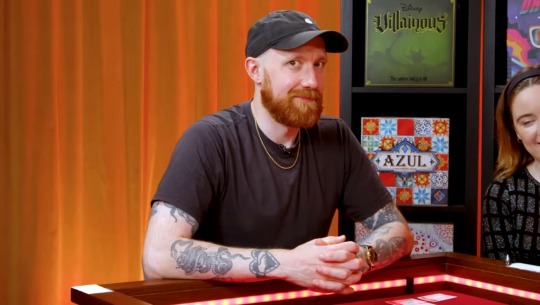
He really said:

(From Monopoly But COMMUNIST 2 | House Rules)
311 notes
·
View notes
Text

if someone had told me that the only fanart i would have completed in a month was for NRB i wouldn't have believe them
233 notes
·
View notes
Text
Spent the last couple minutes of house rules today absolutely terrified that they were going to start talking about ao3
#i fully believe that ao3 counts as the dark web to Sullivan and Dom#i was fully Frightened#and instead it was just the most tame things here#nrb#no rolls barred#house rules
101 notes
·
View notes
Text
another warm welcome to everyone who just watched the new house rules
129 notes
·
View notes
Text
Letting Players Feel Smart in Combat
or, "Running Encounters with an Information Economy"
PREAMBLE: Something that frustrated me for a long time as a player in TTRPGs was how hard it could be to guess enemy tactics. There are a lot of things that you can do with good tactics, but a lot of the time you lack the information to use those tactics. For example, setting up a prepared action to counterspell just wastes your turn if nobody tries to cast anything. This can be especially frustrating when you're up first in the initiative, and don't have much more than just a description of who/what you're fighting to go off of.
AN ANECDOTE: One day I decided to try an experiment. Each round of combat was supposed to be happening in the same six seconds of elapsed time, right? So, the next time I went first, I asked my GM if I could see what the enemies were doing - everything was happening at the same time, so I should be able to read their body language, the directions they were starting to move, and where they were looking to get an idea of how they were going to act, right?
As I honestly had been expecting, my GM said no. It wasn't their turn yet, so they weren't doing anything yet. I resolved that I did not want to run my own games that way, so I came up with some ways that when I ran a game, I could help my players to not be going into battle completely blind.
THE POINT: Tipping players off to enemy tactics is just good GMing. When they get a "read" on an enemy, they'll feel like an absolute genius. When the party plans for what the enemy will do and uses tactics to put the odds in their favor, they will lose their minds over how cool they feel. Here's a couple things I do to make that happen.
The first is giving enemies tells for what they're planning, which sounds simple, but actually requires a change to how encounters are typically run. Basically, you should know what an enemy will do before their turn, and typically at the end of the last one. Then you narrate them doing something to hint at that as part of their action. For example, a dragon might inhale deeply before using its breath weapon, or a manticore might slowly go from lashing its tail from side to side to holding it stiff as it prepares to launch a volley of spikes.
You don't have to stay committed to a course of action once you've given a tell, but if the players do something that would cause an enemy to reconsider its tactics (or determine them, if you hadn't decided anything for it yet), that's another time to give a tell. For instance, you might have already described a dire wolf lowering on its haunches as it starts stalking toward the ranger, ready to pounce, when the halfling rogue stops taking cover behind the fighter. In that case, you might describe the dire wolf shifting its stance, licking its lips as it turns its attention to this weaker-looking prey.
There's no need to give a tell for every action, of course. That would get taxing for you, and tedious for the party. Generously sprinkling in clues as to key things enemies want to do can keep players engaged, and help them break through the indecision about what to do with their own turns, though.
That brings me to my other trick. If you read the anecdote section above, this is something I came up with as a direct result of that. I decided to add a special action type that is just for the players, the "Observe Action". Every player gets one Observe Action on each of their turns that they can use in a number of ways to get more information about the conditions on the battlefield, or to gain an advantage.
The first use is just applying their skills in the normal way. If they could use a skill to recall information about a particular creature, they now do this as an Observe Action. This one is technically an explicit nerf in Pathfinder, since recalling is stated to be no action, but I find that most groups only check on one monster at a time anyway, and on the occasions when they don't, starting combat with check spam just slows the action down, so I include it. It usually doesn't hurt anything, and having it on the list can actually remind players that doing this is a thing they can do in the first place.
The second is also more or less a bookkeeping task, and that's using informational magic, like the Detect spells. It doesn't change the cast time, but once the spell is up, any further focus to gain more information uses their Observe Action. This is mostly just to remind players they can have these going while they fight, but I do also make any part of using the spell once cast that would normally be a Standard Action into an Observe instead, as a small bonus.
The third use, and the first truly new option, is to "read" a group. This is similar to recalling information, but allows for some different questions to be asked. Use these as a baseline.
Who has the highest/lowest HP?
Who can deal the most damage with physical attacks.
Who has the highest bonus to hit?
General "lean" of the group's alignment. (Most common alignment component on a single axis.)
How challenging does this fight look? (General CR range of the encounter, described as Easy, Average, Challenging, etc...)
Individual with the highest/lowest value in a particular ability score.
Highest/lowest value in a particular saving throw.
Basically, this option is there to help players decide who to focus their attention on. Let them use it for whatever will help them get a better idea of who or what they're facing. Let them ask their main question up-front before rolling to establish the check (whatever skill and DC seems appropriate), but let them ask additional questions after if they get a high roll.
It goes hand in hand with the last option, which is gauging intent. This one should probably be done with Insight/Sense Motive, and it just comes down to that original question. What's going to happen next?
The first way this can work is that the player focuses on a specific enemy, and gets a sense of what that enemy specifically intends to do. In other words, the player tells you who they want to get a "tell" for, and if they succeed, you give it to them.
Alternatively, the player might ask if anyone in the enemy group is about to take a specific action. For example, "Is the cleric about to get targeted." or "Does anyone look like they're going to call for backup?" So basically, instead of focusing on the behavior of one individual, the player is staying alert for a particular situation. Don't let the players get too broad with this one, of course, but it's okay to be a little generous with what they can ask about.
Even more than when I advised it above, if someone successfully gauges the intent of their enemy, and that intent changes, let them know. You should treat a success as them continuing to be alert to what they were observing for until their next turn.
I also toyed with the idea of letting players use their Observation to look for openings to improve their chance of hitting, or for a weak spot to do more damage. I like the idea of this, but felt like it stepped on the toes of other, existing options too much, and would be too tempting to players over the other uses. So I decided to keep Observation Actions as purely a source of information, and not directly pumping numbers. Still, if it sounds like it would work for you, try it out.
For everyone who read this incredibly long post of mine, I hope it helps you out. I haven't done a post like this in a long time, and I really appreciate you taking the time to read it. If these rules improve anyone else's games, hearing that would really make my day.
#ttrpg#tabletop roleplaying#dungeons & dragons#pathfinder#game mastery#running the game#encounter design#roleplaying games#game master advice#house rules#long post#essay#homebrew#this is just what works for me
86 notes
·
View notes
Text
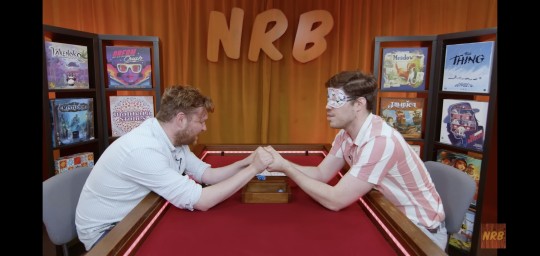
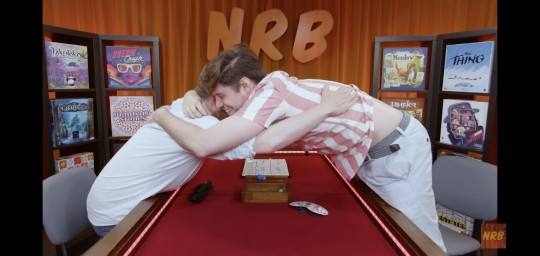
Hey people who don't watch No Rolls Barred / Board Game Club / House Rules:
Can you interpret what is going on here. Please?
#no rolls barred#board game club#nrb#house rules#sullivan beau brown#adam blampied#look at them#look at my boys
136 notes
·
View notes
Note
Are there kinks/tropes you dislike and will never write? :)
Heyy! ^^
Here are some house rules:
Things I don’t write include cheating, suicide, physical abuse and permanent bodily harm, necrophilia, pedophilia, age play, adult babies, incest, piss, scat, vore, fisting, feminization, raceplay, food play, foot fetish, furries, M x M, F x F (threesome/poly is fine)
I mostly steer clear of heavy noncon, dubcon territory is fine
I like to read hybrids and alpha/beta/omega stuff but as a writer they're really not my specialty
I only write for f reader simply because I’m cis f and therefore that’s my "area of expertise"
I rarely if ever accept prompts for exclusively BIPOC characters due to my limited understanding of their culture
33 notes
·
View notes
Text
With how fucking funny this house rules was i think that they should just stick dom into every single episode at this point
I think that adam brought an interesting dynamic to the table that he was willing to be mean and fight with other players and have different relationships with them. It was also very funny seeing him being brought down.
They need someone who can have different reactions with different people. And not just be nice to everyone. Makes it more interesting in my opinion
28 notes
·
View notes
Text

via @MojoRisin286 on twitter
105 notes
·
View notes
Text
More Humane Than Human - Humanity as degeneration vs. Humanity as detachment
I wanted to repost the Requiem readthrough review before I got into this, because it started as one of those "Requiem vs. Masquerade which is better" conversations. In rules terms I think V5 has iterated successfully on Requiem - there's probably about the same density of actual rules there but V5 makes a better fist of hiving some of them off into advanced/optional/discretionary territory - but Requiem innovates hard in terms of ideas about how vampires and vampirism work, introducing things like the Predator's Taint and Lashing Out and, crucially, Touchstones.
Touchstones give the lie to the "V5 does rules better" claim. I have never liked how V5 does them. The notion of tying an individual vampire to a person, place or artefact is nothing new. Those of us who are Old, or retro-curious, may recall Vampire: the Masquerade - Redemption, in which Brujah himbo protagonist Christof is told he needs an "anchor" for his Humanity and selects Anezka, the nun who nursed him back to health and who he's been having less than holy thoughts about ever since he woke up. Christof is told, by his mentor Wilhelm, that choosing a person as his "anchor" is a dangerous call - but his mind is made up and, not to spoil a twenty-five-year-old game, it turns out to be for the best for both of them... as long as he's kept his Humanity up, anyway.
So, Touchstones in the context of Masquerade are nothing new to me - in fact I was quite surprised when the full TTRPG didn't have rules for them. But! Touchstones in V5 are a bit different. Instead of one, there are many: instead of humanity in general, each of the vampire's Convictions has a named person attached to it.
The problem - and this isn't just me, it's something that's come up in all the V5 games I've played or hosted - is that viable characters have two or three Convictions. Coming up with two or three Touchstones at character generation, before you have a feel for who this person is and how you're going to play them and what their routine looks like, has not worked for anyone I've played the game with. One might work - most of us can ideate a relationship with one other person before we start playing - but three seems to stretch the limited sense of a starting character's identity too thin.
Rules As Written, of course, a Touchstone doesn't have to be someone significant to the story. They can just be someone your character saw every day, or sees every night, or notices every time they pass by. But... that's bullshit. That is not a "hang a key element of your personal ethic and capacity for self care on this person" relationship. I can see the story beat of "this person isn't there any more and you're morally shook by it" working once, maybe, but still, permanently altering your character's relationship with the Beast is kind of an integral function of the game. It feels like that hat should be hung on a sturdier hook - a full-on fleshed-out SPC. Like in Requiem, where you get one Touchstone.
Also, Humanity works differently, at its most fundamental level, and this exposes a key difference between the two games - one where I think Requiem is strides ahead. @awakenedsalamander touched on this talking about the differences in the concept of the Masquerade between the two games, but I want to go deeper on it.
In Masquerade, Humanity is about degeneration - it's the Downward Spiral, an almost inevitable drift from Man to Beast with exceptions being so rare they're practically mythical. It's about becoming worse, with all the moral judgment that implies, about committing acts that appear on a Hierarchy of Sins.
(At least, it is in V20. V5 abolishing that in favour of chronicle specific Tenets and character specific Convictions is really smart. I didn't grasp how it was meant to work from the corebook - it took the Player's Guide to spell it out to me - but now that I grok it, I love the tension between the Tenets that forbid and govern a character's actions and the Convictions that excuse and forgive those actions.)
In Requiem, Humanity is detachment. It's about the state of being a vampire slowly and inexorably reminding you over and over that you're not human any more, drifting further and further away from what you were and into the all-night society of predators. It's quantified in terms of Breaking Points - roughly grouped by significance and severity, these experiences hammer home that you're dead, you're dead, you're dead and out of this world. It's less "I did a bad thing" and more "I experienced something that no human ever should" like walking off a stab wound or being reminded you're a hundred years old and still act like you're twenty. When you hit a Breaking Point, you roll a number of dice - how many is a function of how serious and hard to avoid confronting the Breaking Point is - to avoid losing Humanity.
Now. In the past I've met quite a few players who don't really want to engage with the morality play aspects of Masquerade. Whether that's "we want to speedrun to Humanity 4 so we can play the game 'properly' without having to pretend we regret doing all the things RPG protagonists do" or "we think it's kinda stupid the way low Humanity says you may no longer create art or have sex without 'faking it' and let's interrogate what the developers think 'sex' is, shall we?" doesn't really matter. Maybe you want to play on the theme of post-humanity rather than be wrist-slapped for trying to do main character stuff. I don't blame you.
I think it should be possible to wholesale lift the Requiem system of detachment, rolled for at Breaking Points and mitigated by a singular Touchstone who can be a more developed character, or a place, or an object, and slot that into V5 replacing Tenets, Convictions and Stains.
That gives you a version of Humanity that's more permissive and less frontloaded, allows you to go deep on one hook instead of ideating sets of pairs before you even know who your character is. It also divorces functions of sexuality and creativity from being a good person - in the Requiem model, vampires fuck, and make art, and low Humanity expresses more in how they do it than whether or not they can.
(Although - there'd need to be some finesse around Oblivion, since I think the Discipline's theme of entropy inducing personal decay still works in the detachment model - maybe keep Stains as an additional lever, a function of Messy Criticals and dangerous Disciplines, and have Breaking Points inflict Stains instead of automatically triggering rolls...)
Important note on this idea: this does NOT exempt you from having a conversation about what's off limits in Session 0. It's easy to miss this in the V5 core book, but Chronicle Tenets aren't a safety tool. Chronicle Tenets are the moral rules that are going to come up A LOT in play, they define what your coterie collectively accepts as Doing A Bad Thing, to be excused for personal reasons (i.e. Convictions). An actual out of character trigger, an aspect of the World of Darkness with which a real live person who exists does not wish to engage, is a line or a veil - something we either don't include, or don't narrate explicitly. It's not something we build into one of the game's mechanical loops and ensure will come up. That would be... the absolute opposite of safe.
Whadda we think?
#vtm#vtr#vampire the masquerade#vampire the requiem#meta#house rules#humanity#// this took a lot longer than I expected - I either have long covid or my arthritis levelled up over this winter...
32 notes
·
View notes
Text


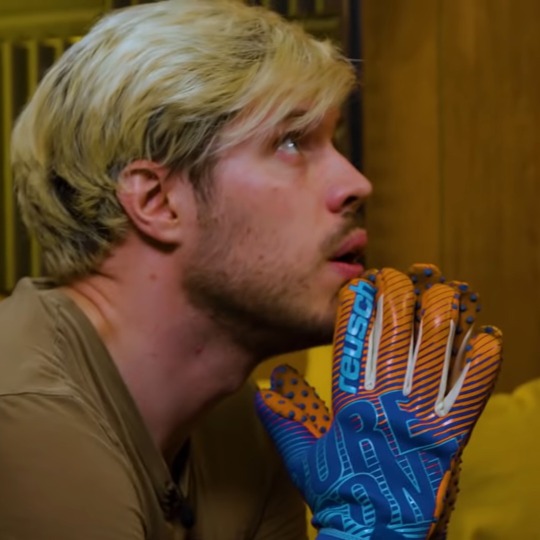

could someone PLEASE look at me the way Mister Adam Blampied looked at Sullivan in this episode of House Rules
#no rolls barred#nrb#adam blampied#sullivan beau brown#house rules#rewatched this episode today and had no idea how absolutely maniacal adam looks with dishevelled hair#hear me out...#HEAR ME OUT
105 notes
·
View notes
Text
Of course I love him, he's wet and pathetic

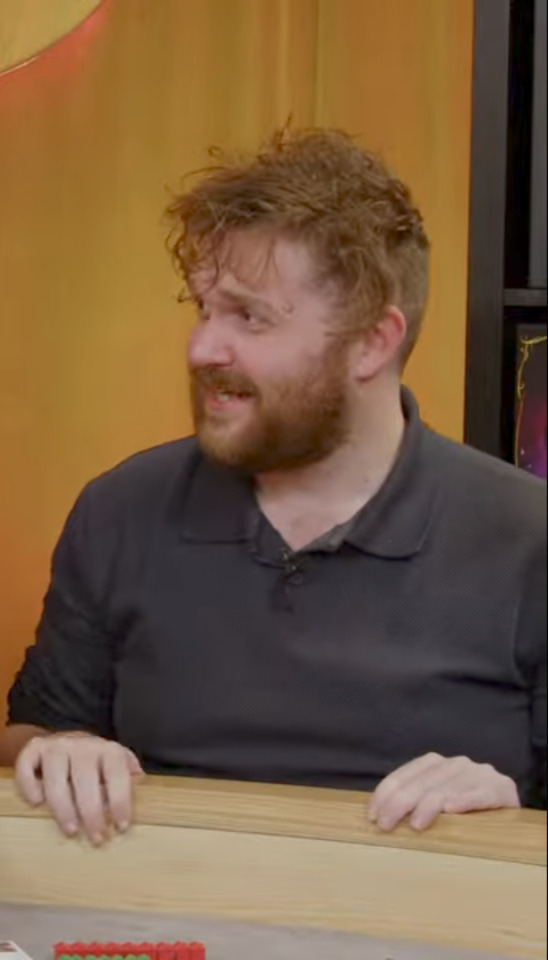
#nrb#no rolls barred#sullivan beau brown#hes hot#wet and pathetic#somebody needs to help him escape#its not going to be me#i like watching him suffer too much#who said that#house rules
63 notes
·
View notes
Text
the fear in my body everytime they mention tumblr
68 notes
·
View notes
Text

Rachel Sontag, "House Rules"
#pretty words#house rules#rachel sontag#literature#quotes#and wanting something brought on more despair than wanting nothing!!!!!!
12 notes
·
View notes